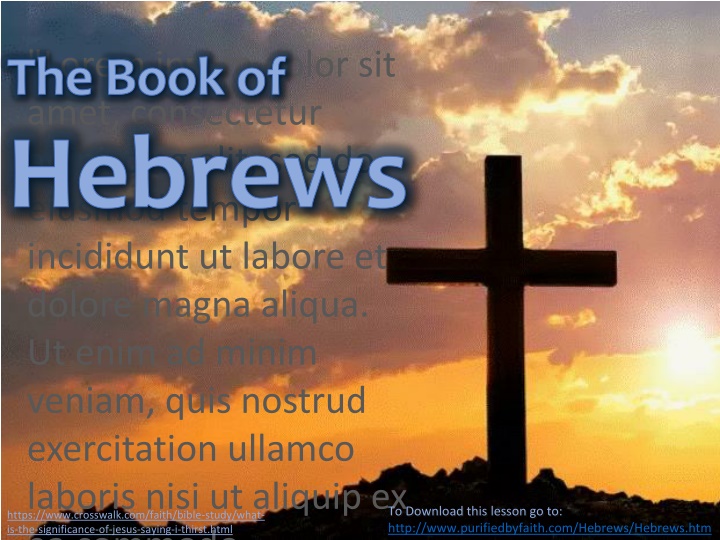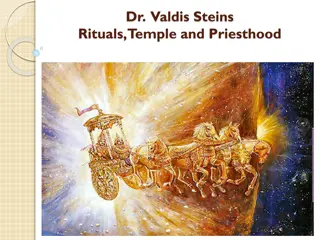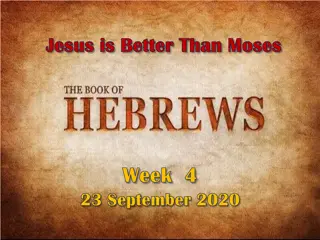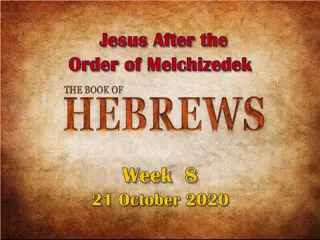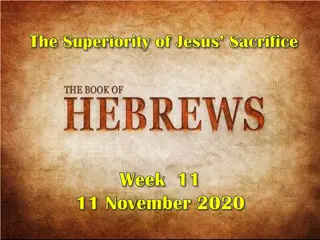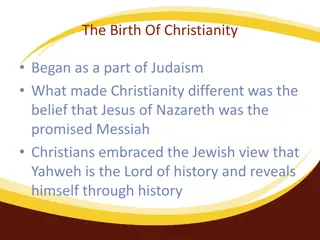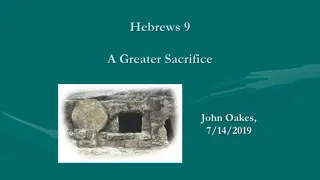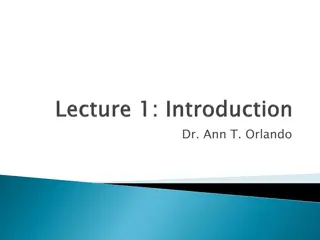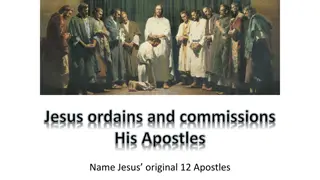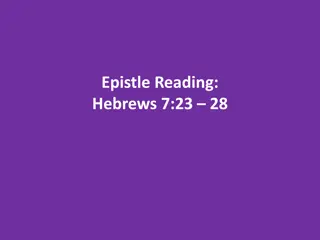Jesus Is Better Than the Levitical Priesthood
In the Book of Hebrews, Jesus is presented as superior to the Levitical priesthood, offering a compassionate yet sinless high priest who understands human weaknesses. This passage emphasizes the New Covenant's superiority and the ability to find grace and mercy in times of need.
Download Presentation

Please find below an Image/Link to download the presentation.
The content on the website is provided AS IS for your information and personal use only. It may not be sold, licensed, or shared on other websites without obtaining consent from the author.If you encounter any issues during the download, it is possible that the publisher has removed the file from their server.
You are allowed to download the files provided on this website for personal or commercial use, subject to the condition that they are used lawfully. All files are the property of their respective owners.
The content on the website is provided AS IS for your information and personal use only. It may not be sold, licensed, or shared on other websites without obtaining consent from the author.
E N D
Presentation Transcript
"Lorem ipsum dolor sit amet, consectetur adipiscing elit, sed do eiusmod tempor incididunt ut labore et dolore magna aliqua. Ut enim ad minim veniam, quis nostrud exercitation ullamco laboris nisi ut aliquip ex ea commodo The Book of Hebrews To Download this lesson go to: http://www.purifiedbyfaith.com/Hebrews/Hebrews.htm https://www.crosswalk.com/faith/bible-study/what- is-the-significance-of-jesus-saying-i-thirst.html
Outline of Hebrews Jesus is Better I. Jesus Is Better Than the OT Prophets (1:1-4) II. Jesus Is Better Than the Angels (1:5-2:18) III. Jesus Is Better Than Moses (3:1-4:13) IV.Jesus Priesthood Is Better Than the Levitical Priesthood (4:14-10:18)
Jesus Priesthood Is Better Than the Levitical Priesthood (4:14-10:18) In the same way in which the author developed the rest theme, the author now aims to show that the Old Testament Scriptures themselves upgrade, and at the same time, announce the obsolescence of the very priesthood that most Jews thought was the most important aspect of their Jewish faith. To most of the original readers of this letter, when someone said, high priest, they would think instantly of the Levitical high priest. So what the author intends to do now is to relativize that understanding and to show that their very own Old Testament Scriptures, announce the principled obsolescence of that priesthood with some huge implications. DA Carson Jesus is Better Six Studies in Hebrews (2002)
Outline of Hebrews IV.Jesus Priesthood Is Better Than the Levitical Priesthood (4:14-10:18) A. Jesus Is a Compassionate But Sinless High Priest (4:14 16) B. Jesus Was Appointed By God to Be Our High Priest (5:1-10) C. Warning and Assurance (5:11-6:20) D. Jesus Is a Priest After the Order of Melchizedek (7:1-28) E. The New Covenant Is Better than the Old (8:1-13) F. We Have a Better Sacrifice Under the New Covenant (9:1-10:18)
Jesus is a Compassionate But Sinless High Priest (4:14 16) 14 Since then we have a great high priest who has passed through the heavens, Jesus, the Son of God, let us hold fast our confession. 15 For we do not have a high priest who is unable to sympathize with our weaknesses, but one who in every respect has been tempted as we are, yet without sin. 16 Let us then with confidence draw near to the throne of grace, that we may receive mercy and find grace to help in time of need.
14 Since then we have a great high priest who has passed through the heavens, Jesus, the Son of God, let us hold fast our confession. This theme of Jesus as high priest has already been introduced a couple of times in the book of Hebrews. The first time Jesus is identified as high priest explicitly is in Heb 2:17, where we were told that [Jesus] had to be made like his brothers in every respect, so that he might become a merciful and faithful high priest Now, after having warned his readers in the previous two verses (Heb 4:12 13) that God stands over against us in judgment and God s Word is not to be played with, the author reintroduces this theme of Jesus as high priest as a word of encouragement to his readers. DA Carson Jesus is Better Six Studies in Hebrews (2002)
14 Since then we have a great high priest who has passed through the heavens, Jesus, the Son of God, let us hold fast our confession. He points out that our great high priest has passed through the heavens There s that heavenly theme again that we ve seen over and over in the letter. Furthermore, our great high priest bears the title Son of God bringing back to mind a major theme of the book s first two chapters, where the incarnation and exaltation of the Son were on display. Therefore, he tells us, knowing we have this great high priest we should be encouraged to hold fast our confession. DA Carson Jesus is Better Six Studies in Hebrews (2002)
15 For we do not have a high priest who is unable to sympathize with our weaknesses, but one who in every respect has been tempted as we are, yet without sin. Jesus is not only a majestic high priest who has passed through the heavens and sits at the right hand of God. He is also a tender high priest who is able to sympathize with our weaknesses . He is not a distant and aloof high priest, but is himself intimately acquainted with the human condition. Indeed, during his earthly ministry, he experienced the full range of human temptation. The delight and joys offered by sin were no stranger to Jesus. He was cognizant of and experienced the attractiveness of sin, realizing that it brought pleasure (cf. Heb 11:24-25). Schreiner, Thomas R. Evangelical Biblical Theology Commentary - Hebrews; pp. 153-154
15 For we do not have a high priest who is unable to sympathize with our weaknesses, but one who in every respect has been tempted as we are, yet without sin. Jesus understands every temptation we face, since he experienced something similar. And yet he never surrendered to sin s power. What we need is not a fellow loser, but a winner; not one who shares our defeat but one who is able to lead us to victory; not a sinner, but a savior. It is evident from this text that sin is not intrinsic and inherent to human nature. Jesus was fully human in every respect, and yet he never sinned. Schreiner, Thomas R. Evangelical Biblical Theology Commentary - Hebrews; pp. 153-154
16Let us then with confidence draw near to the throne of grace, that we may receive mercy and find grace to help in time of need. Following the description of Jesus as a compassionate high priest in the previous verse, the author now gives a second exhortation: Let us then with confidence draw near to the throne of grace. This exhortation flows naturally from verses 14 15 as shown by the conjunction then . Jesus compassionate disposition (as described in the previous verse) invites us to intimacy with God in fact, it makes that intimacy possible. The exhortation let us draw near translates a present tense form of the verb, indicating that drawing near to God constitutes an ongoing aspect of the Christian s relationship with God: let us constantly draw near. Guthrie, George H. The NIV Application Commentary - Hebrews; p. 176
16 Let us then with confidence draw near to the throne of grace, that we may receive mercy and find grace to help in time of need. Under the old covenant the only person allowed into God s presence was the high priest, who entered the Most Holy Place once a year on the Day of Atonement. Under that covenant the high-priestly offering on that day won forgiveness for the people. Yet they were still locked out of the presence of Yahweh. But under Jesus high priesthood, the people of God find a much better situation. They themselves may enter the very presence of God on a continual basis, and can do so with confidence a word that can also be translated as bold frankness, which in both Hellenistic Judaism and early Christian usage is related especially to the believer s approach to God in prayer. Guthrie, George H. The NIV Application Commentary - Hebrews; p. 176
16 Let us then with confidence draw near to the throne of grace, that we may receive mercy and find grace to help in time of need. Christians, therefore, should draw near to God with unabashed openness since God alone is the true source of mercy and grace. Because of these provisions we can expect God will help [us] in [our] time of need. The author may have in mind the trial of persecution being faced by his readers, a trial that was tempting them to reject God s mercy in Christ. The author assures them that if they remain faithful to their confession and approach God through Jesus high-priestly work, God will come through with help in a timely fashion. Guthrie, George H. The NIV Application Commentary - Hebrews; p. 176
Outline of Hebrews IV.Jesus Priesthood Is Better Than the Levitical Priesthood (4:14-10:18) A. Jesus Is a Compassionate But Sinless High Priest (4:14 16) B. Jesus Was Appointed By God to Be Our High Priest (5:1-10) C. Warning and Assurance (5:11-6:20) D. Jesus Is a Priest After the Order of Melchizedek (7:1-28) E. The New Covenant Is Better than the Old (8:1-13) F. We Have a Better Sacrifice Under the New Covenant (9:1-10:18)
Jesus Was Appointed By God to Be Our High Priest (5:1-10) 1 For every high priest chosen from among men is appointed to act on behalf of men in relation to God, to offer gifts and sacrifices for sins. 2 He can deal gently with the ignorant and wayward, since he himself is beset with weakness. 3 Because of this he is obligated to offer sacrifice for his own sins just as he does for those of the people. 4 And no one takes this honor for himself, but only when called by God, just as Aaron was.
Jesus Was Appointed By God to Be Our High Priest (5:1-10) 5 So also Christ did not exalt himself to be made a high priest, but was appointed by him who said to him, "You are my Son, today I have begotten you [Psalm 2:7b] 6 as he says also in another place, "You are a priest forever, after the order of Melchizedek." [Ps 110:4b]
Jesus Was Appointed By God to Be Our High Priest (5:1-10) 7 In the days of his flesh, Jesus offered up prayers and supplications, with loud cries and tears, to him who was able to save him from death, and he was heard because of his reverence. 8 Although he was a son, he learned obedience through what he suffered. 9 And being made perfect, he became the source of eternal salvation to all who obey him, 10 being designated by God a high priest after the order of Melchizedek.
Jesus Was Appointed By God as the Perfect High Priest (5:1-10) - High Level Overview - Universal Principles of High Priesthood (5:1 4) These verses are axiomatic in that they draw on universally understood (within a biblical framework) principles related to the office of high priest. As such they do not address Jesus priesthood but rather the office of high priest as designed under the old covenant. The last of these principles shows that one becomes a high priest only by God s appointment. The Appointment of Christ as High Priest (5:5 6) As the next step in the discussion, verses 5 6 proclaim that Christ has been appointed as high priest by God. This is shown by using two OT quotations: Psalm 2:7 and Psalm 110:4. The Pathto Christ s Appointment (5:7 10) The unit concludes with a powerful treatment on what might be called the path of appointment that the Son had to walk in order to qualify for being designated high priest by God a path of obedience to suffering and death. Guthrie, George H. The NIV Application Commentary - Hebrews; p. 186
1 For every high priest chosen from among men is appointed to act on behalf of men in relation to God, to offer gifts and sacrifices for sins. The author begins by explaining the concept of high priest as found in the Old Testament. High priests were chosen from among men and were appointed to represent human beings before God with gifts and sacrifices that atone for sins. An angel, for example, would not qualify for the office since it was restricted to human beings. High priests must be human beings since they are chosen to represent human beings before God. In other words they have a special privilege and responsibility to serve as mediators between human beings and God. Schreiner, Thomas R. Evangelical Biblical Theology Commentary - Hebrews; pp. 157-158
2 He can deal gently with the ignorant and wayward, since he himself is beset with weakness. This verse describes the solidarity of the high priest with human beings he represents before God. The high priest does not belong to a different class of humanity. He is able to relate and minister to those who are ignorant and led astray since he also was stained with sin. The verb deal gently indicates that the priests avoided anger (at least ideally), since they themselves were sinners. Those who are ignorant probably refers to those who committed sins unintentionally (Lev 4:2, 13; 5:18; Num 5:22-29) and wayward to those wandering from the things of God. Defiant sins are not included here, for such sins are equivalent to the apostasy against which the author warns, and makes clear there is no forgiveness for such rebellion (see Num 15:30-31; Deut 17:12-13) Schreiner, Thomas R. Evangelical Biblical Theology Commentary - Hebrews; pp. 158-159
2he himself is beset with weakness. 3 Because of this he is obligated to offer sacrifice for his own sins just as he does for those of the people. The high priest is able to identify with those who sin, for he himself is beset with weakness , which, as verse 3 indicates, includes his own sinfulness. Therefore he is required to make an offering both for his own sins and for the sins of the people. So, the high priest is able to deal gently and compassionately with sinners since he shares the same human condition as they do. Schreiner, Thomas R. Evangelical Biblical Theology Commentary - Hebrews; pp. 158-159
4 And no one takes this honor for himself, but only when called by God, just as Aaron was. The author of Hebrews next proclaims that the office of high priest is not one for which a person can enlist; God himself confers the honor by appointment (e.g., Ex. 28:1; Lev. 8:1; Num. 16:5). In other words, the position of high priest derives from divine rather than human authority. God initiated the role of high priest, and any high priest thereafter must be called by God in order to be considered the authentic and authoritative representative for the people before God. Guthrie, George H. The NIV Application Commentary - Hebrews; p. 176
5 So also Christ did not exalt himself to be made a high priest, but was appointed by him who said to him, "You are my Son, today I have begotten you [Psalm 2:7b] Just as Aaron didn t appoint himself as high priest, neither did Jesus. Jesus didn t seek his own glory and exalt himself to high priest. As the Son of God, he was appointed by God as the words of Psalm 2 attest. The humility of Jesus comes to the forefront here. He didn t seek his own glory, but the glory of God (cf. John 8:50, 54), and God exalted him and appointed him as high priest because rather than pursuing his own honor, he sought the glory of God. For proof that God anointed Jesus as high priest, the author appeals to Psalm 2, a verse that he cited in Heb 1:5 to support Jesus superiority to the angels as the Son. Schreiner, Thomas R. Evangelical Biblical Theology Commentary - Hebrews; pp. 160-161
5 So also Christ did not exalt himself to be made a high priest, but was appointed by him who said to him, "You are my Son, today I have begotten you [Psalm 2:7b] It s a bit surprising that the author turns to Psalm 2:7, for the text says nothing about Jesus as priest; it emphasizes his kingship instead. The author may have quoted Psalm 2:7 because Jesus is a priest-king like Melchizedek. In other words, Jesus is a particular kind of priest, a priest who serves as king just as Melchizedek did. Scholars have long discussed when Jesus became high priest, but the author of Hebrews doesn t tell us precisely when Jesus priestly ministry began. Clearly Jesus obedience and earthly ministry were crucial for his priestly sacrifice and, it is certainly the case that Jesus, upon his exaltation, was installed as heavenly high priest. Schreiner, Thomas R. Evangelical Biblical Theology Commentary - Hebrews; pp. 160-161
6 as he says also in another place, "You are a priest forever, after the order of Melchizedek." [Ps 110:4b] Here we have the first mention of Melchizedek in this letter. Jesus appointment as high priest is confirmed by Psalm 110:4, where David prophesies that the one who is his Lord (Psalm 110:1) is also a priest forever according to the order of Melchizedek. Melchizedek first appears in the biblical story in Gen 14:18-20 where Abraham gives him a tenth of the spoils won in battle and Melchizedek blesses him. Melchizedek then vanishes from the scene until his name suddenly appears in Psalm 110:4. In fact this is the only other text in the OT that mentions this mysterious and puzzling character. Schreiner, Thomas R. Evangelical Biblical Theology Commentary - Hebrews; pp. 160-161
6 as he says also in another place, "You are a priest forever, after the order of Melchizedek." [Ps 110:4b] When we consider the context of Psalm 110, it is clear that David prophesies about the coming future king, for he will sit at God s right hand, ruling and reigning (110:1) He will rule with his scepter over his enemies (110:2) He will crush and destroy his enemies (110:5-7). The king is certainly a Davidic king, fulfilling the promise of a future Davidic ruler (cf. e.g., Psalm 89, 132). Psalm 110:4, however adds another dimension: The future ruler is not only a king, but he is also a priest, and yet not a priest in the line of Aaron. Jesus priesthood stems from an entirely different order: he is a Melchizedekian king-priest. In any case, the main point of this verse is that God appointed him as a Melchizedekian priest. Jesus did not take that honor on himself. Schreiner, Thomas R. Evangelical Biblical Theology Commentary - Hebrews; pp. 160-161
7In the days of his flesh, Jesus offered up prayers and supplications, with loud cries and tears, to him who was able to save him from death, and he was heard because of his reverence. Rather than Jesus appointment to high priesthood being conferred simply by virtue of his relationship to God, the path to appointment was one of suffering, obedience, and endurance. The phrase in the days of his flesh makes an overt reference to Jesus incarnation in general, but the rest of verses 7 8 hints at a specific event Jesus agonizing surrender to the Father s will in the Garden of Gethsemane (Matt. 26:36 46; Mark 14:32 42; Luke 22:40 46). Although some commentators have found fault with linking this passage to the Gospel garden accounts, others have understood him who was able to save him from death as a clear allusion to Jesus request for the cup of suffering to pass him by. Guthrie, George H. The NIV Application Commentary - Hebrews; pp. 189-190
7 In the days of his flesh, Jesus offered up prayers and supplications, with loud cries and tears, to him who was able to save him from death, and he was heard because of his reverence. While the outcome of Gethsemane may suggest that God did not hear that prayer in the sense of exempting Christ from going to the cross, God did hear it, affirming the righteousness of his Son s reverent submission through the resurrection. The loud cries and tears , although not part of the Gethsemane accounts, probably stem from one or more prayers of the righteous sufferer found in the Psalms. Both the psalms of righteous suffering and the Gethsemane accounts portray reverence . This word renders a Greek word which can also be translated fear (in the sense of reverence) of God, piety. The Father attended to the Son s cries because of Jesus posture of complete abandonment to the Father s will. Guthrie, George H. The NIV Application Commentary - Hebrews; pp. 189-190
8 Although he was a son, he learned obedience through what he suffered. 9And being made perfect Even though he is God s Son and has a special relationship with God, Jesus still had to learn obedience through his sufferings. The word learned suggests a process. There is no suggestion that Jesus ever disobeyed (cf. 4:15; 7:26), as if he had to learn to obey because he disobeyed previously any more than saying that he became a merciful and faithful high priest (2:17) means he was formerly callous or faithless. Schreiner, Thomas R. Evangelical Biblical Theology Commentary - Hebrews; pp. 164-165
8 Although he was a son, he learned obedience through what he suffered. 9 And being made perfect This verse emphasizes Jesus humanity. He learned obedience as he experienced life day by day. In particular, he learned obedience in his sufferings. When suffering strikes, human beings are inclined to do whatever it takes to avoid it. Jesus, however, learned how to trust God and do his will in the midst of his suffering. Likewise, Jesus was made perfect in his sufferings. As we saw when we looked at a similar statement in Heb 2:10, in the Greek OT (Septuagint), the word translated perfect (teleioo) often signified the act of consecration when a priest was ordained for the performance of his priestly duties (e.g., Ex 28:41; 29:9,29,33; Lev 16:32, etc.) In other words, Christ s sufferings and ultimately his death equipped and qualified him to serve as our high priest. Schreiner, Thomas R. Evangelical Biblical Theology Commentary - Hebrews; pp. 164-165
9 And being made perfect, he became the source of eternal salvation to all who obey him, 10 being designated by God a high priest after the order of Melchizedek. These last two verses proclaim the happy result of the Son s being prepared though his suffering: He became the source of eternal salvation. This verse closely links Christ s perfection process to his death on the cross, where our great high priest offered up himself as the sacrifice for sin. For it is only through his death on the cross that Christ was able to offer the salvation referred to here. Salvation comes, however, to those whose lives are characterized by obedience to him. Just as Jesus learned obedience in his earthly suffering, he calls people to respond in obedience to his will. Guthrie, George H. The NIV Application Commentary - Hebrews; p. 191
9 And being made perfect, he became the source of eternal salvation to all who obey him, 10 being designated by God a high priest after the order of Melchizedek. Just as Jesus persevered, reverently conforming his will to that of the Father in spite of extreme suffering, so Christians are called to total obedience to God s will; this call does not change even when we experience suffering and persecution. This section concludes with the author reiterating that as a result of the Son s suffering, he has been appointed by God to fill the position of high priest after the order of Melchizedek. This final statement plays an important role as a transition to the discussion of Melchizedek beginning in Heb 7:1. Guthrie, George H. The NIV Application Commentary - Hebrews; p. 191
Class Discussion Time https://www.weareteachers.com/moving-beyond-classroom-discussions/
*Class Discussion Time One of the issues that any sincere student of the Bible must grapple with is the degree to which there is continuity versus discontinuity between the new and old covenants. As we have seen, this is an issue that the author of Hebrews is particularly keen on addressing, since his audience is on the verge of throwing off their new covenant beliefs and, in the process, their commitment to Jesus himself. The author of Hebrews shows high regard for the OT scriptures, citing them as the authoritative word of God. He also gives serious attention to OT instructions, such as we saw today in the principles governing the appointment and function of the OT high priest.
*Class Discussion Time But at the same time, throughout this book, the author shows a stunning contrast between the old covenant, which anticipated its own obsolescence and the things of the new covenant which far outshine the old. Today at least two contrasts immerged: The old covenant high priest who had to offer sacrifices for his own sins versus Jesus, the new covenant high priest, who is utterly sinless The old covenant people who were locked out of access to God s presence except for the high priest who represented them before God once a year on the Day of Atonement versus new covenant believers who are invited to enter the presence of God on a continual basis Were you struck by these contrasts as we examined the text today? Do you think we sometimes take for granted the privileges we have as new covenant believers?
*Class Discussion Time What motivates me in my pursuit of God? In his little essay God in the Dock, C. S. Lewis wrote: The ancient man approached God (or even the gods) as the accused person approaches his judge. For the modern man the roles are reversed. He is the judge: God is in the dock. He is quite a kindly judge: if God should have a reasonable defense for being the god who permits war, poverty and disease, he is ready to listen to it. The trial may even end in God s acquittal. But the important thing is that Man is on the Bench and God in the dock. This does not represent the worldview of Hebrews. According to our author, God s decree should mean something to us; it should constitute the motive for action in our lives. We must sit up and take notice of what God has said and its implications for our lives. Guthrie, George H. The NIV Application Commentary - Hebrews;
*Class Discussion Time As an appropriate application of Hebrews 5:1 10, therefore, we might begin by reflecting on our current motivations for engaging in Christ-following. Why are you doing what you are doing? Is the fact that God has appointed Jesus to a position of honor in which we are called to obey him significant for us as motivation for continuing in our commitment? Or are we more moved by the call of our world s system of values (even in our pursuit of Christianity)? Guthrie, George H. The NIV Application Commentary - Hebrews;
